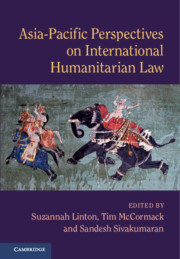Book contents
- Asia-Pacific Perspectives on International Humanitarian Law
- Asia-Pacific Perspectives on International Humanitarian Law
- Copyright page
- Contents
- Figures and Tables
- Contributors
- Foreword
- Foreword
- Acknowledgements
- Editors’ Note
- 1 Introduction: Asia-Pacific Perspectives on International Humanitarian Law
- Part I Interviews
- Part II Development of International Humanitarian Law
- Part III Practice and Application of International Humanitarian Law
- Part IV Implementation and Enforcement of International Humanitarian Law
- 28 International Humanitarian Law in the Indian Civilian and Military Justice Systems
- 29 Implementation of International Humanitarian Law Obligations in Australia: A Mixed Record
- 30 International Humanitarian Law in Indonesia
- 31 International Humanitarian Law in the Philippine Supreme Court
- 32 The Application of Grave Breaches at the Extraordinary Chambers in the Courts of Cambodia
- 33 The Application of International Humanitarian Law by the International Crimes Tribunals of Bangladesh
- 34 The Application of the Geneva Conventions in Nepal: Domestication As a Way Forward
- 35 Torture in Non-International Armed Conflict and the Challenge of Universal Jurisdiction: The Unsuccessful Trial of Colonel Kumar Lama
- Part V Looking to the Future and Enhancing Compliance with International Humanitarian Law
- Glossary of Publications
- Alphabetical Glossary of Cases and Decisions
- Chronological Glossary of Cases and Decisions
- Treaties and Other International Instruments, Resolutions and National Documents with an International Dimension
- Chronological Glossary of National Legislation and Secondary Instruments
- Peace Agreements and Communiques
- Abbreviations and Translations
- Index
34 - The Application of the Geneva Conventions in Nepal: Domestication As a Way Forward
from Part IV - Implementation and Enforcement of International Humanitarian Law
Published online by Cambridge University Press: 18 October 2019
- Asia-Pacific Perspectives on International Humanitarian Law
- Asia-Pacific Perspectives on International Humanitarian Law
- Copyright page
- Contents
- Figures and Tables
- Contributors
- Foreword
- Foreword
- Acknowledgements
- Editors’ Note
- 1 Introduction: Asia-Pacific Perspectives on International Humanitarian Law
- Part I Interviews
- Part II Development of International Humanitarian Law
- Part III Practice and Application of International Humanitarian Law
- Part IV Implementation and Enforcement of International Humanitarian Law
- 28 International Humanitarian Law in the Indian Civilian and Military Justice Systems
- 29 Implementation of International Humanitarian Law Obligations in Australia: A Mixed Record
- 30 International Humanitarian Law in Indonesia
- 31 International Humanitarian Law in the Philippine Supreme Court
- 32 The Application of Grave Breaches at the Extraordinary Chambers in the Courts of Cambodia
- 33 The Application of International Humanitarian Law by the International Crimes Tribunals of Bangladesh
- 34 The Application of the Geneva Conventions in Nepal: Domestication As a Way Forward
- 35 Torture in Non-International Armed Conflict and the Challenge of Universal Jurisdiction: The Unsuccessful Trial of Colonel Kumar Lama
- Part V Looking to the Future and Enhancing Compliance with International Humanitarian Law
- Glossary of Publications
- Alphabetical Glossary of Cases and Decisions
- Chronological Glossary of Cases and Decisions
- Treaties and Other International Instruments, Resolutions and National Documents with an International Dimension
- Chronological Glossary of National Legislation and Secondary Instruments
- Peace Agreements and Communiques
- Abbreviations and Translations
- Index
Summary
It is a well-established principle under the four Geneva Conventions of 1949 (Geneva Conventions) that a State is required to prosecute individuals for grave breaches of the conventions. The Geneva Conventions oblige State parties to enact criminal legislation to prosecute individuals that order or commit grave violations. Likewise, there is an obligation to domesticate the Geneva Conventions and duly share their contents with civilians as well as militants. The non-domestication of the Geneva Conventions in Nepal has led to a plethora of complexities in the current context, where the State is striving to establish transitional justice by prosecuting crimes of the past and provide justice to victims.
- Type
- Chapter
- Information
- Asia-Pacific Perspectives on International Humanitarian Law , pp. 608 - 623Publisher: Cambridge University PressPrint publication year: 2019

